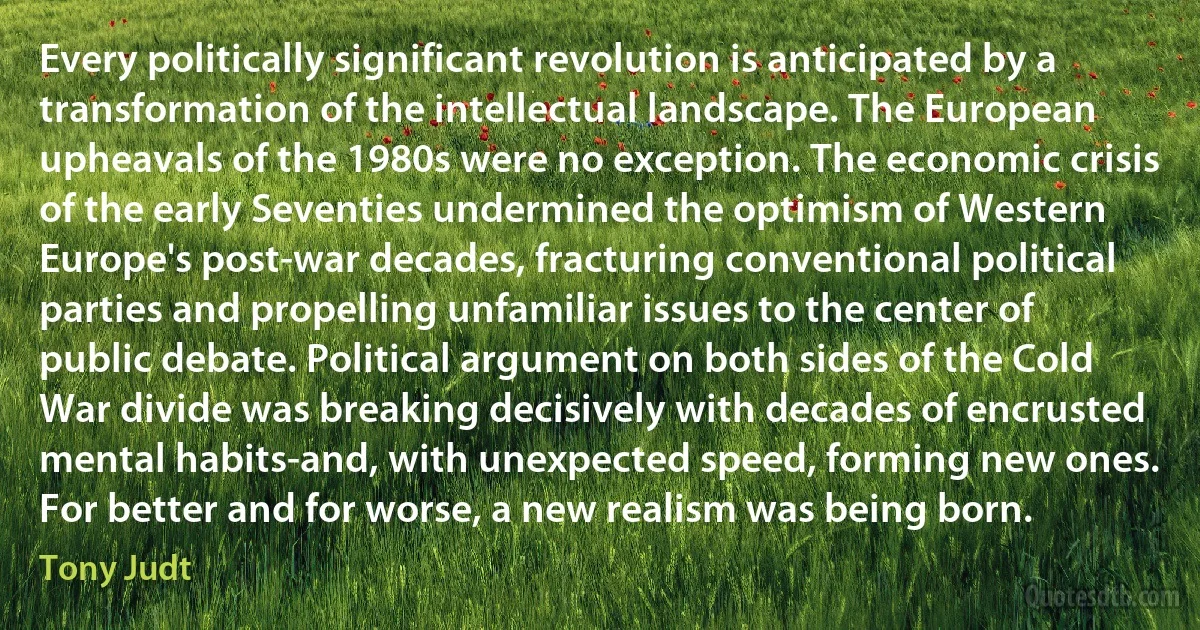
Every politically significant revolution is anticipated by a transformation of the intellectual landscape. The European upheavals of the 1980s were no exception. The economic crisis of the early Seventies undermined the optimism of Western Europe's post-war decades, fracturing conventional political parties and propelling unfamiliar issues to the center of public debate. Political argument on both sides of the Cold War divide was breaking decisively with decades of encrusted mental habits-and, with unexpected speed, forming new ones. For better and for worse, a new realism was being born.
Tony JudtRelated topics
argument born breaking cold conventional debate divide early exception forming fracturing intellectual ones public realism revolution seventies significant speed transformation war western worse 1980s unfamiliarRelated quotes
The key intellectual event is a lecture or a formal debate, a period of time when one individual holds the floor to deliver a sustained argument on a particular topic. This is different from the give-and-take of sociable conversations, which typically cannot reach any complex or abstract level because the focus shifts too often. Intellectuals giving their attention for half an hour or more to one viewpoint, developed as a unified stream of discourse, are thereby elevating the topic into a larger, more encompassing sacred object than the little fragmentary tokens of ordinary sociable ties.

Randall Collins
I believe that there is a necessary connection in both directions between the physical and the mental, but that it cannot be discovered a priori. Opinion is strongly divided on the credibility of some kind of functionalist reductionism, and I won't go through my reasons for being on the antireductionist side of that debate. Despite significant attempts by a number of philosophers to describe the functional manifestations of conscious mental states, I continue to believe that no purely functionalist characterization of a system entails - simply in virtue of our mental concepts - that the system is conscious.

Thomas Nagel
It was not an unfamiliar sensation, but it was strange to feel it in the daytime. Mostly, it was a nighttime visitor, an ever-gentle gnawing at the back of the head that had to be always guarded against, lest its realization sweep forth with a cold familiar rush. It was the sudden startling glimpse over the edge-the realization that death is inevitable, that it happens to everyone, that it would happen to me too; that someday, someday, the all-important I (the center of the whole thing) would cease to exist. Would stop. Would end. Would no longer be. Nothing. Nobody. Finished. Death.

David Gerrold
Hey, does anybody notice this crazy thing that we're on the road to socialism? I'm just saying. Wow. We got - we got the SCHIPs thing going for us. That's great. There is the change that we were all hoping for, really, seriously. Hey, I got an idea. If we're going down the road to socialism, I mean, why not really go for it, huh? Comrades, good news from the western front, our glorious revolution is starting to take hold. Oh, the revolution of change. Our fearless leader has just signed in SCHIPs, and earlier today, he spoke out against capitalism. Listen up.

Glenn Beck
Modern Feminism has two distinct sides to it: (1) an articulate political and economic side embracing demands for so-called rights; and (2) a sentimental side which insists in an accentuation of the privileges and immunities which have grown up, not articulately or as the result of definite demands, but as the consequence of sentimental pleading in particular cases. In this way, however, a public opinion became established, finding expression in a sex favouritism in the law and even still more in its administration, in favour of women as against men.

Ernest Belfort Bax
